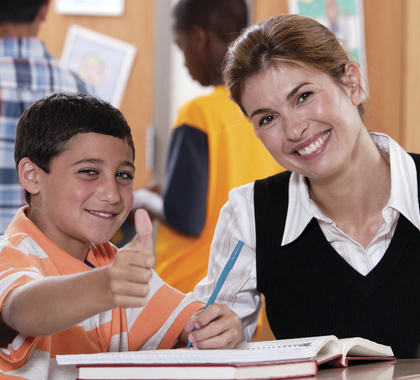A recent survey by EdChoice and EdChoice Kentucky found that 83 percent of private schools in the Bluegrass State were aware of the recently-established Education Opportunity Account (EOA) education savings account (ESA) program and 97 percent of private schools in the commonwealth would participate in the program.
The survey also finds there are at least 6,607 open seats available to accommodate children taking part in EOA at the schools taking part in the survey, while there are probably around 19,600 total open seats across Kentucky.
EOA, passed in 2021 and due to launch during the 2022–23 school year, is a trial program that will be open to families with household incomes below 175 percent of the federal poverty level, which is roughly 49 percent of Kentucky families. Funding per student would be roughly $4,600, or only about a third of the average per-pupil spending on a student in one of the commonwealth’s district schools. Without legislative approval, the program will stop after 2026.
Copious empirical research on school choice programs such as ESAs makes clear these programs offer families improved access to high-quality schools that meet their children’s unique needs and circumstances, and that these programs improve academic performance and attainment and deliver a quality education at lower cost than traditional public schools.
Additionally, education choice benefit public school students and taxpayers by increasing competition, decreasing segregation, and improving civic values and practices. Research also shows students at private schools are less likely than their public school peers to experience problems such as alcohol abuse, bullying, drug use, fighting, gang activity, racial tension, theft, vandalism, and weapon-based threats. There is also a strong causal link suggesting private school choice programs improve the mental health of participating students.
It is probably for these reasons, and also because teacher unions have repeatedly played politics with school closings during the COVID-19 pandemic in direct conflict with students’ best interests, that education choice programs like ESAs are more popular with parents than ever before. Polling by EdChoice released in September 2021 found 78 percent support for ESAs among the general public and 84 percent among current school parents. These findings are mirrored in the American Federation for Children’s eighth-annual National School Choice Poll, released in March 2022, which found 77 percent support for ESA programs.
With a current budget cap of only $25 million, the EOA program can only serve around 5,000 students, or just 0.8 percent of all K–12 students in the Bluegraa State. The General Assembly should increase this cap so that more children can participate in the program, as the EdChoice survey shows there is plenty of space available for them in the commonwealth’s private schools. They should also seek to make this program permanent, and increase the per-pupil allocation to something closer to the amount of per-pupil spending in public schools.
The goal of public education in Kentucky today and in the years to come should be to allow all parents to choose which schools their children attend, require every school to compete for every student who walks through its doors, and make sure every child has the opportunity to attend a quality school. Establishing the Education Opportunity Account program was a logical first step in meeting that goal, and expanding the program is the logical next step. There has not been a time when providing these opportunities has been more urgent and more needed than right now.
The following documents provide more information about education choice programs.
Exploring Kentucky’s Private Education Sector
https://www.edchoice.org/wp-content/uploads/2022/03/03-2022-KY-Brief.pdf
This report synthesizes information about the state’s private schools from a survey conducted by EdChoice Kentucky in partnership with EdChoice.
Fiscal Effects of School Choice
https://www.edchoice.org/wp-content/uploads/2021/11/Fiscal-Effects-of-School-Choice-Condensed.pdf
This EdChoice analysis of 40 private educational choice programs in 19 states plus D.C. summarizes the facts and evidence on the fiscal effects of educational choice programs across the United States and finds they have provided up to $28.3 billion in net fiscal savings to state and local taxpayers through Fiscal Year 2018. The programs in the analysis include three education savings accounts programs (ESAs), 19 school voucher programs, and 18 tax-credit scholarship programs.
The 123s of School Choice (2020 Edition)
https://www.edchoice.org/wp-content/uploads/2020/04/123s-of-School-Choice-2020-4.pdf
This report from EdChoice is an in-depth review of the available research on private school choice programs in America. Areas of study include: private school choice program participant test scores, program participant attainment, parent satisfaction, public school students’ test scores, civic values and practices, racial/ethnic integration and fiscal effects.
A Win-Win Solution: The Empirical Evidence on School Choice (Fourth Edition)
http://www.edchoice.org/wp-content/uploads/2016/05/A-Win-Win-Solution-The-Empirical-Evidence-on-School-Choice.pdf
This paper by EdChoice details how a vast body of research shows educational choice programs improve academic outcomes for students and schools, saves taxpayers money, reduces segregation in schools, and improves students’ civic values. This edition brings together a total of 100 empirical studies examining these essential questions in one comprehensive report.
The Public Benefit of Private Schooling: Test Scores Rise When There Is More of It
https://object.cato.org/sites/cato.org/files/pubs/pdf/pa830.pdf
This Policy Analysis from the Cato Institute examines the effect increased access to private schooling has had on international student test scores in 52 countries. The Cato researchers found that a 1 percentage point increase in the share of private school enrollment would lead to moderate increases in students’ math, reading, and science achievement.
The Effects of School Choice on Mental Health
https://papers.ssrn.com/sol3/papers.cfm?abstract_id=3272550
This study from Corey DeAngelis at the Cato Institute and Angela K. Dills of Western Carolina University empirically examines the relationship between school choice and mental health. It finds that states adopting broad-based voucher programs and charter schools witness declines in adolescent suicides and suggests that private schooling reduces the number of times individuals are seen for mental health issues.
Child Safety Accounts: Protecting Our Children through Parental Freedom
https://heartland.org/wp-content/uploads/documents/CSAccountsPB.pdf
In this Heartland Policy Brief, Vicki Alger, senior fellow at the Independent Women’s Forum and research fellow at the Independent Institute, and Heartland Policy Analyst Tim Benson detail the prevalence of bullying, harassment, and assault taking place in America’s public schools and the difficulties for parents in having their child moved from a school that is unsafe for them. Alger and Benson propose a Child Safety Account program, which would allow parents to immediately have their child moved to a safe school – private, parochial, or public – as soon as parents feel the public school their child is currently attending is too dangerous to their child’s physical or emotional health.
Nothing in this Research & Commentary is intended to influence the passage of legislation, and it does not necessarily represent the views of The Heartland Institute. For further information on this subject, visit School Reform News, The Heartland Institute’s website, and PolicyBot, Heartland’s free online research database.
The Heartland Institute can send an expert to your state to testify or brief your caucus; host an event in your state; or send you further information on a topic. Please don’t hesitate to contact us if we can be of assistance! If you have any questions or comments, contact Heartland’s government relations department, at [email protected] or 312/377-4000.




